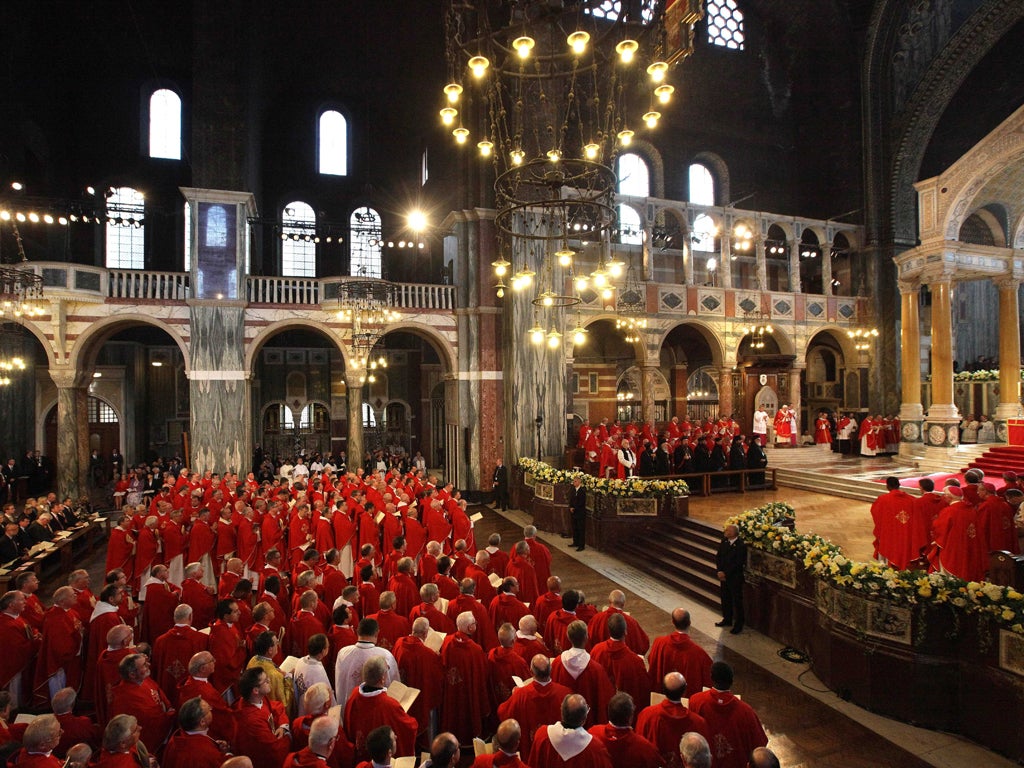English Catholics braced for a Mass disturbance
Feelings are running high about the introduction of a new translation of the traditional liturgy

Your support helps us to tell the story
From reproductive rights to climate change to Big Tech, The Independent is on the ground when the story is developing. Whether it's investigating the financials of Elon Musk's pro-Trump PAC or producing our latest documentary, 'The A Word', which shines a light on the American women fighting for reproductive rights, we know how important it is to parse out the facts from the messaging.
At such a critical moment in US history, we need reporters on the ground. Your donation allows us to keep sending journalists to speak to both sides of the story.
The Independent is trusted by Americans across the entire political spectrum. And unlike many other quality news outlets, we choose not to lock Americans out of our reporting and analysis with paywalls. We believe quality journalism should be available to everyone, paid for by those who can afford it.
Your support makes all the difference.For well over 1,000 years the English-speaking world celebrated the Roman Catholic Mass in Latin.
The great change came only in 1973 when, after the liberalising mood of the Second Vatican Council, a form of the liturgy was produced in the voice of the common man for the first time.
Three decades since redrafting began, a new version of the Mass is finally going live in churches across the English-speaking world on Sunday to mark the beginning of Advent.
But the gestation of the new Roman Missal has not been without rancour and pain. The Vatican twice went over the heads of English-speaking bishops to order it rewritten, which led to accusations of high-handedness and secrecy targeted at the conservative forces surrounding Pope Benedict and his predecessor John Paul II.
Some scholars even compared the handling of its introduction to the shortcomings of the way the Catholic Church dealt with the clerical-abuse scandal.
Britain's five million Catholics have already been dealing with half of the new liturgy since September. How- ever, the full translation becomes compulsory from Sunday.
The Catholic Church has paved the way for the updated text through digital marketing – Twitter, YouTube and the internet have all played their part. But there remains division.
Despite the tendency of the church to pull together in times of trouble some are said to be "quietly seething" at the change. One senior theologian said: "The process managed to offend everybody involved who has any intellectual or moral integrity."
To its supporters the new Mass is a richer text, truer to its Latin origins. Opponents say the new translation – although needed in some form – shifts too far away from the plain English style of the earlier version. They argue it is flowerier, often drawing on imperial court language and sounding stilted and artificial to modern ears.
It also marks a sea change in the consensual way of doing things under Vatican Two, it is claimed.
Father Allen Morris, parish priest at Church of Our Lady in St John's Wood, north London, conceded that churchgoers would notice the changes but be pleasantly surprised by what they hear.
"There are people who object to change for all sorts of reasons. Some don't like the idea of a language that is more heightened," he said. But since the introduction of aspects of the new Mass in the autumn feedback had been "positive" and churchgoers had reported experiencing greater understanding as a result of the richer language, he said.
There are misgivings about the new Mass in the US, where the changes are being introduced in one go this weekend. The Rev Michael Ryan, pastor of St James Cathedral in Seattle, said the text had lost its "noble simplicity".
"We're dealing with a power play on the part of people in Rome who wanted to make changes in order, I think, to bring under greater control people in the English-speaking world," he said.
Philip Endean, who teaches theology at Oxford University, agreed that those who had watched the rewriting process unfold were not finding the switch easy. "Nevertheless, the Roman Catholic instinct is to maintain the peace, to do what you are told, and to trust that God works through the Church's authority. This instinct seems to be kicking in," he said.
Join our commenting forum
Join thought-provoking conversations, follow other Independent readers and see their replies
Comments